- Home
- Gustave Aimard
The Trail-Hunter: A Tale of the Far West
The Trail-Hunter: A Tale of the Far West Read online
Produced by Camilo Bernard and Marc D'Hooghe athttps://www.freeliterature.org (Images at the InternetArchive, scanned by Google)
THE TRAIL HUNTER.
A TALE OF THE FAR WEST.
BY
GUSTAVE AIMARD,
AUTHOR OF "THE PRAIRIE FLOWER," "THE INDIAN CHIEF," ETC.
LONDON:
WARD AND LOCK,
158, FLEET STREET.
1861.
PREFACE.
The present volume of Aimard's Indian Tales is devoted to the earlieradventures of those hunters, whose acquaintance the reader has formed,I trust with pleasure, in the preceding series. It does not become me tosay anything further in its favour, than that the sustained interest ofthe narrative, which has been regarded as the charm of stories referringto life in the desert and prairie, has not been departed from in thisinstance. The stories themselves supply an innate proof of the writer'scorrectness to Nature, and, in truth, many of the scenes are sostartling that they must be the result of personal observation.
In conclusion, I may be permitted to thank the Press generally for thekindly aid they have afforded me in making the English translation ofAimard's volumes known to the British reading public, and the hearty wayin which they have recognized the merits of the previous series. Itwould be an easy task to collect paragraphs, expressing a belief thatAimard is second to none of the writers who have hitherto describedIndian life and scenery; but I prefer to rest my hopes of success on theinherent qualities of his stories.
LASCELLES WRAXALL.
CONTENTS.
PART I. RED CEDAR PART II. EL PRESIDIO DE SANTA FE
I.--The Virgin Forest I.--El Rancho de Coyote II.--The Contest II.--The Cuchillada III.--Don Miguel Zarate III.--The Hunters IV.--The Peccaries IV.--Sunbeam V.--The Wound V.--The Adoption VI.--The Squatter's Shanty VI.--The Missionary VII.--The Rangers VII.--The Interview VIII.--The Valley of the Buffalo VIII.--The Prison IX.--The Assassination IX.--The Embassy X.--The Sachem of the Coras X.--The Presentation XI.--Conversation XI.--Psychological XII.--El Meson XII.--Diamond Cut Diamond XIII--Red Cedar XIII.--A Stormy Discussion XIV.--The Two Hunters XIV.--The Mystery XV.--Fray Ambrosio XV.--The Ambuscade XVI.--Two Varieties of Villains XVI.--A Friendly Discussion XVII.--El Canyon Del Buitre XVII.--Nathan XVIII.--Father Seraphin XVIII.--The Wounded Man XIX.--Unicorn XIX.--Indian Diplomacy XX.--The Hunt of Wild Horses XX--The Stranger XXI.--The Surprise XXI.--General Ventura XXII.--The Meeting XXII.--The Comanches XXIII.--The Abduction XXIII.--Negotiations XXIV.--The Revolt XXIV.--Free XXV.--The Meeting XXVI.--Dona Clara XXVII.--El Vado del Toro
TRAIL HUNTER BY GUSTAVE AIMARD.
CHAPTER I.
THE VIRGIN FOREST.
In Mexico the population is only divided into two classes, the upper andthe lower. There is no intermediate rank to connect the two extremes,and this is the cause of the two hundred and thirty-nine revolutionswhich have overthrown this country since the declaration of itsindependence. Why this is so is simple enough. The intellectual power isin the hands of a small number, and all the revolutions are effected bythis turbulent and ambitious minority; whence it results that thecountry is governed by the most complete military despotism, instead ofbeing a free republic.
Still the inhabitants of the States of Sonora, Chihuahua, and Texas haveretained, even to the present day, that stern, savage, and energeticphysiognomy which may be sought in vain among the other States of theConfederation.
Beneath a sky colder than that of Mexico, the winter, which frequentlycovers the rivers of the region with a thick layer of ice, hardens themuscles of the inhabitants, cleanses their blood, purifies their hearts,and renders them picked men, who are distinguished for their courage,their intelligence, and their profound love of liberty.
The Apaches, who originally inhabited the greater portion of New Mexico,have gradually fallen back before the axe of the pioneers; and afterretiring into the immense deserts that cover the triangle formed by theRio Gila, the Del Norte, and the Colorado, they ravage almost withimpunity the Mexican frontiers, plundering, firing, and devastating allthey meet with on their passage.
The inhabitants of the countries we alluded to above, held in respect bythese ever-shifting savages, are in a state of continual warfare withthem, always ready to fight, fortifying their haciendas, and onlytravelling with weapons in their hands.
El Paso del Norte may be regarded as the outpost of the civilisedportion of Mexico. Beyond that, to the north and north-west, extend thevast unfilled plains of Chihuahua, the _bolson_ of Mapimi, and the ariddeserts of the Rio Gila. These immense deserts, known by the name ofApacheria, are still as little investigated as they were at the close ofthe eighteenth century. El Paso del Norte owes its name to its situationnear a ford of the Rio Del Norte. It is the oldest of all the NewMexican settlements, and its establishment dates back to the close ofthe sixteenth century. The present settlement is scattered for adistance of about ten miles along the banks of the Del Norte, andcontains four thousand inhabitants at the most. The _plaza_, or villageof the Paso, is situated at the head of the valley: at the otherextremity is the Presidio of San Elezario. All the interval is occupiedby a continuous line of white, flat-roofed houses, buried in gardens,and surrounded by vineyards. About a mile above the ford the stream isdammed up, and led by a canal into the valley, which it waters.Apacheria begins only a few miles from this settlement.
It is easily seen that the foot of civilised man has only troddentimidly and at rare intervals this thoroughly primitive country, inwhich nature, free to develop herself under the omnipotent eye of thecreator, assumes an aspect of incredible beauty and fancifulness.
On a lovely morning in the month of May, which the Indians call "themoon of the flowers," a man of high stature, with harsh and markedfeatures, mounted on a tall, half-tamed steed, started at a canter fromthe plaza, and after a few minutes of hesitation, employed in realisinghis position, resolutely buried his spurs in the horse's flanks, crossedthe ford, and after leaving behind him the numerous cottonwood treeswhich at this spot cover the river banks, proceeded toward the denseforest that flashed on the horizon.
This horseman was dressed in the costume generally adopted on thefrontiers, and which was so picturesque that we will give a shortdescription of it. The stranger wore a pelisse of green cloth,embroidered with silver, allowing a glimpse of an elegantly-workedshirt, the collar of which was fastened by a loosely-knotted black silkhandkerchief, the ends passed through a diamond ring. He wore greencloth breeches, trimmed with silver, and two rows of buttons of the samemetal, and fastened round the hips by a red silken scarf with goldfringe. The breeches, open on the side half way up the thigh, displayedhis fine linen drawers beneath: his legs were defended by a strip ofbrown embossed and stamped leather, called _botas vaqueras_, attachedbelow the knee by a silver garter. On his heels enormous spurs clanked.A _manga_, glistening with gold, and drawn up on the shoulder, protectedthe upper part of his body, while his head was sheltered from theburning sunbeams by a broad-leafed hat of brown stamped felt, the crownof which was contracted by a l
arge silver _toquilla_ passed twice orthrice round it.
His steed was caparisoned with graceful luxuriousness, which heightenedall its beautiful points: a rich saddle of embossed leather, adornedwith massive silver, on the back of which the _zarape_ was fastened;wide Moorish silver stirrups, and handsome water bottles at thesaddle-bow; while an elegant _anquera_, made of openwork leather, anddecorated with small steel chains, entirely covered the horse's croup,and sparkled with its slightest movement.
The stranger appeared, judging from the luxury he displayed, to belongto the high class of society. A _machete_ hung down his right side,two pistols were passed through his girdle, the handle of a long knifeprotruded from his right boot, and he held a superbly damascened rifleacross the saddle in front of him.
Bending over the neck of his galloping steed, he advanced rapidlywithout looking round him, although the landscape that lay extendedbefore him was one of the most attractive and majestic in those regions.
The river formed the most capricious windings in the centre of a terraindiversified in a thousand strange ways. Here and there on the sandybanks enormous trees might be seen lying, which, dried up by the sun,evidenced, in their washed-out appearance, that they had been dead forcenturies. Near the shallow and marshy spots, caymans and alligatorswandered about awkwardly. At other places, where the river ran almoststraight, its banks were uniform, and covered with tall trees, roundwhich creepers had twined, and then struck root in the ground again,thus forming the most inextricable confusion. Here and there smallclearings or marshy spots might be detected in the midst of the densewood, often piled up with trees that had died of old age. Further on,other trees, which seemed still young, judging from their colour and thesolidity of their bark, fell into dust with the slightest breath ofwind.
At times, the earth, entirely undermined beneath, drawn down by its ownweight, dragged with it the wood which it bore, and produced a crashing,confused sound, which was returned on all sides by the echo, andpossessed a certain degree of grandeur in this desert, whose depths noman has ever yet ventured to scrutinise.
Still the stranger galloped on, with his eye ardently fixed before him,and not appearing to see anything. Several hours passed thus: thehorseman buried himself deeper in the forest. He had left the banks ofthe river, and only progressed with extreme difficulty, through theentanglement of branches, grass, and shrubs, which at every steparrested his movements, and forced him to make innumerable turnings. Hemerely reined in his horse now and then, took a glance at the sky, andthen started again, muttering to himself but one word:
"_Adelante_! (Forward!)"
At length he stopped in a vast clearing, took a suspicious glance aroundhim, and probably reassured by the leaden silence which weighed on thedesert, he dismounted, hobbled his horse, and took off its bridle thatit might browse on the young tree shoots. This duty accomplished, hecarelessly lay down on the ground, rolled a maize cigarette in hisfingers, produced a gold _mechero_ from his waist belt, and struck alight.
The clearing was of considerable extent. On one side the eye couldsurvey with ease, through the trees, the widely extending prairie, onwhich deer were browsing with security. On the other side, the forest,wilder than ever, seemed, on the contrary, an impassable wall ofverdure. All was abrupt and primitive at this spot, which the foot ofman had so rarely trodden. Certain trees, either entirely or partiallydried up, offered the vigorous remains of a rich and fertile soil;others, equally ancient, were sustained by the twisted creepers, whichin the course of time almost equalled their original support in size:the diversity of the leaves produced the strangest possible mixture.Others, containing in their hollow trunk a manure which, formed of theremains of their leaves and half-dead branches, had warmed the seedsthey had let fall, and offered, in the young shoots they contained, somecompensation for the loss of their father tree.
In the prairies, nature, ever provident, seems to have been desirous toshelter from the insults of time certain old trees, patriarchs of theforest which are crushed beneath the weight of ages, by forming them acloak of greyish moss, which hangs in festoons from the highest branchesto the ground, assuming the wildest and most fantastic shapes.
The stranger, lying on his back, with his head resting on his twocrossed hands, was smoking with that beatitude, full of ease and sloth,which is peculiar to the Hispano-Americans. He only interrupted thisgentle occupation to roll a fresh cigarette and cast a glance around,while muttering:
"Hum! He keeps me waiting a long time."
He emitted a puff of bluish smoke, and resumed his first position.Several hours passed thus. Suddenly, a rather loud rustling was heard inthe thicket, some distance behind the stranger.
"Ah, ah!" he said, "I fancy my man is coming at last."
In the meanwhile, the sound became louder, and rapidly approached.
"Come on, hang it!" the horseman shouted, as he rose. "By our Lady ofPilar! You have surely been keeping me waiting long enough."
Nothing appeared: the clearing was still deserted, although the soundhad attained a certain degree of intensity. The stranger, surprised atthe obstinate silence of the man he was addressing, and specially by hiscontinuing not to show himself, at length rose to see for himself thereason. At this moment, his horse pricked up its ears, snortedviolently, and made a sudden effort to free itself from the lasso thatheld it; but our new acquaintance rushed toward it and patted it. Thehorse trembled all over, and made prodigious bounds in order to escape.The stranger, more and more surprised, looked round for an explanationof these extraordinary movements, and was soon satisfied.
Scarce twenty yards from him a magnificent jaguar, with asplendidly-spotted hide, was crouched on the main branch of an enormouscypress, and fixed on him two ferocious eyes, as it passed itsblood-red, rugged tongue over its lips with a feline pleasure.
"Ah, ah!" the stranger said to himself in a low voice, but displaying nofurther excitement, "I did not expect you; but no matter, you arewelcome, comrade. _Caray_! We shall have a fight for it."
Without taking his eye off the jaguar, he convinced himself that hismachete quitted its scabbard readily, picked up his rifle, and, afterthese precautions were taken, he advanced resolutely toward theferocious brute, which saw him coming without changing its position. Onarriving within ten yards of the jaguar, the stranger threw away thecigarette he had till now held between his lips, shouldered his rifle,and put his finger on the trigger. The jaguar drew itself together andprepared to leap forward. At the same moment a hoarse yell was heardfrom the opposite side of the clearing.
"Wait a minute," the stranger said to himself with a smile; "it seemsthere are two of them, and I fancied I had to do with a bachelor jaguar.This is beginning to grow interesting."
And he threw a glance on one side. He had not deceived himself: a secondjaguar, rather larger than the first, had fixed its flashing eyes uponhim.

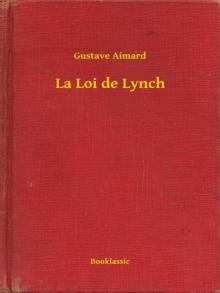 La loi de lynch. English
La loi de lynch. English The Guide of the Desert
The Guide of the Desert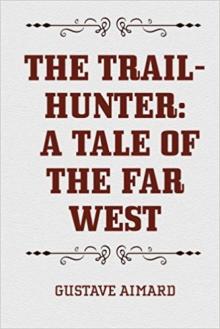 The Trail-Hunter: A Tale of the Far West
The Trail-Hunter: A Tale of the Far West The Pirates of the Prairies: Adventures in the American Desert
The Pirates of the Prairies: Adventures in the American Desert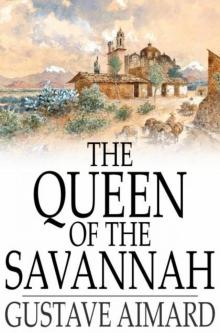 The Treasure of Pearls: A Romance of Adventures in California
The Treasure of Pearls: A Romance of Adventures in California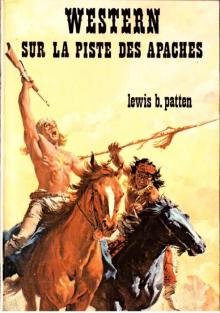 Les outlaws du Missouri. English
Les outlaws du Missouri. English Les trappeurs de l'Arkansas. English
Les trappeurs de l'Arkansas. English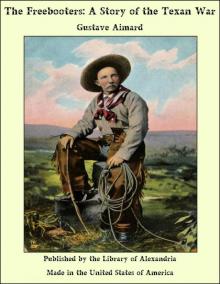 The Border Rifles: A Tale of the Texan War
The Border Rifles: A Tale of the Texan War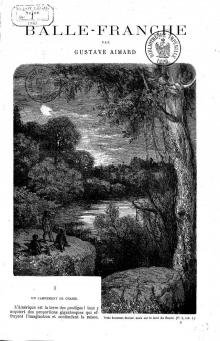 Balle-Franche. English
Balle-Franche. English The Queen of the Savannah: A Story of the Mexican War
The Queen of the Savannah: A Story of the Mexican War The Red Track: A Story of Social Life in Mexico
The Red Track: A Story of Social Life in Mexico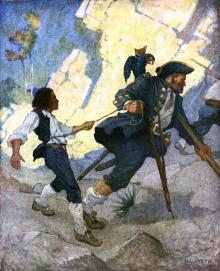 La fièvre d'or. English
La fièvre d'or. English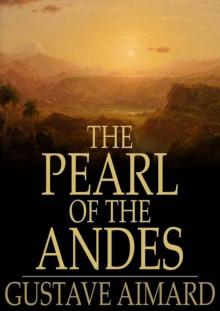 The Pearl of the Andes: A Tale of Love and Adventure
The Pearl of the Andes: A Tale of Love and Adventure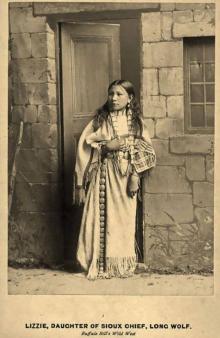 Les fils de la tortue. English
Les fils de la tortue. English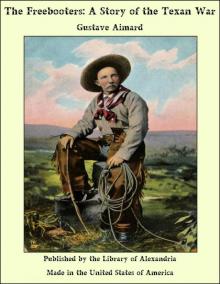 The Indian Chief: The Story of a Revolution
The Indian Chief: The Story of a Revolution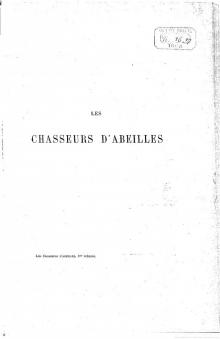 Les chasseurs d'abeilles. English
Les chasseurs d'abeilles. English The Adventurers
The Adventurers